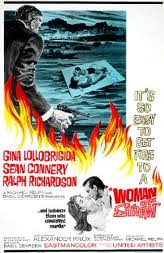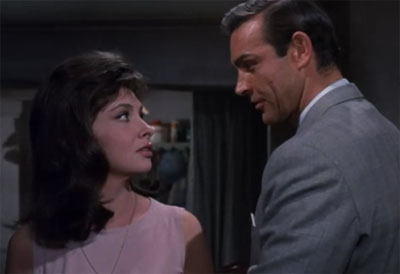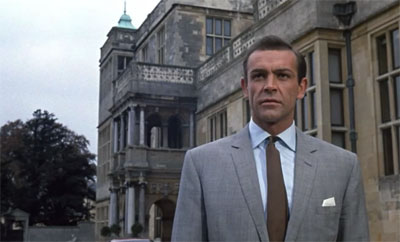 Woman of Straw (1964, Dir. Basil Dearden):
Woman of Straw (1964, Dir. Basil Dearden):
If you’ve seen The Lavender Hill Mob, Kind Hearts and Coronets, or the original Ladykillers, you’re familiar with (and hopefully appreciate) the genteel yet nasty touch of the great dark British comedies. In these films, money is the root of all evil, class resentment, mistrust and simmering hatred are everywhere, and everyone maintains a veneer of veddy English decorum that somehow amplifies the dirty impulses underneath. Think of a nice cup of afternoon tea with a scorpion’s sting hidden at the bottom; you might feel compelled to laugh as you watch these silly, venial people go about the business of being criminals, but the laughter gets caught in your throat as you see how bad timing, bad luck or simply bad karma sabotages their schemes in the most ironic ways.
Basil Dearden was a mainstay at Ealing Studios, the production company that produced these aforementioned classics, but by the early ’60s Ealing was gone and British cinema was going gaga for kitchen sink dramas or new technicolor heroes like Bond, James Bond. Woman of Straw, based on a novel by French writer Catherine Arley, is a peculiar throwback: It may cover similar ground, with its tale of murderous relatives and dupes, the best-laid plans for murder and money going astray, but while Ealing films were populated by ordinary Joes or cheerfully deranged psychos (Alec Guinness often being called in to play both), Woman hedges its bets by featuring the two hottest actors of the time: Sean Connery, coming off From Russia With Love, and Lola Lollobrigida, still a year or so away from being usurped by Sophia Loren as the Italian Belle du Jour.
Dearden seems all too aware that the old, charming ways can no longer be counted on to capture contemporary audiences — instead of the sly comedy that percolated throughout the Ealing classics, Woman leaves an acrid, bitter aftertaste, taking its cue from Ralph Richardson as Charles Richmond, a wheelchair-bound scrooge who never met a man he couldn’t insult, a servant he couldn’t belittle, and a world he couldn’t hate. He may have a fondness for Beethoven symphonies, which he plays ad nauseum through the wall speakers mounted throughout his mausoleum-like mansion, but as a person he is purely staccato, his sentences spit out in fragments. When he is reminded by his ne’er-do-well nephew Anthony (Connery) that a new nurse is coming into his employ, his response is morse code dripping with disdain: “Want a pretty nurse. Not one of those blasted battleaxes. Last one was a hag. Mustache. Had goat’s cheese all day. Stank of it.” And that’s Charles in a relatively jolly mood.
 Unfortunately for him (and fortunately for the audience) the new nurse Maria (Lollobrigida) is very far from being a hag, although it’s clear from the start her motives aren’t entirely pure. Still, after a day of being repulsed by the man (“He treats his animals like servants and his servants like animals”) she’s ready to quit her latest assignment when Anthony, sensing a chance to get at least a portion of his uncle’s money, convinces her to stay on and win over the old codger, with the promise of riches down the road. Despite some decorous hemming and hawing, it doesn’t take much to enlist her — and it certainly helps that Anthony is quite the looker himself. When the trio find themselves on a yacht trip to Majorca, the stage is set for deception and (of course) murder.
Unfortunately for him (and fortunately for the audience) the new nurse Maria (Lollobrigida) is very far from being a hag, although it’s clear from the start her motives aren’t entirely pure. Still, after a day of being repulsed by the man (“He treats his animals like servants and his servants like animals”) she’s ready to quit her latest assignment when Anthony, sensing a chance to get at least a portion of his uncle’s money, convinces her to stay on and win over the old codger, with the promise of riches down the road. Despite some decorous hemming and hawing, it doesn’t take much to enlist her — and it certainly helps that Anthony is quite the looker himself. When the trio find themselves on a yacht trip to Majorca, the stage is set for deception and (of course) murder.
“It’s so easy to set fire to a woman of straw!” proclaimed the ad copy for the movie posters, taking full advantage of Lollabrigida’s status as well, the hottest woman on the planet. Trouble is, you wouldn’t know it by looking at the film. She’s easy on the eyes all right, especially whenever the script requires her to lounge around in a skimpy nightgown, but her character is essentially passive, forced to wear a multitude of hats — we have to believe she’s wise to the world, and yet we also have to believe her when she’s taken in by Anthony’s silver tongue, even as she works up some unexpected feelings for old Charles — and then there’s the final reel, when a trap is sprung and she is reduced to hysteria. That’s a lot of ground to cover, and Lollabrigida isn’t quite up to the demands of the role. How much more interesting would it have been if she had been the inciting influence, hatching the scheme herself only to work herself into doubt as events spun away from her?
 It’s not giving away a whole lot to say that Charles dies under mysterious circumstances, and Richardson is masterful as an old coot who might be an old softie after all, but while the Ealing comedies would have worked this conundrum for a bitterly humorous payoff, Woman is too occupied with its lux vacation settings and luscious sets (courtesy of Ken Adam from the Bond films) to really dig into its characters. Still, seen through the lens of history, Woman remains entertaining. Dearden is an old hand in the best of ways — the film might be leisurely, but the story unfurls with chilly inevitability, and some of the shocks (the ghastly sight of a dead Richardson staring straight at our heroine, as if accusing her) are a welcome antidote to today’s “more is more” aesthetic. Most of all, it’s a kick to see Connery’s James Bond basically transplanted into this movie, his machismo and charm as potent as ever (and made ever-so-respectable in those three-piece suits) even as he plays the coldest, most calculating bastard imaginable. Like the Ealing comedies, Woman of Straw concludes with a twist of fate that ensnares a criminal, and while the latter lacks the subversive kick of the former, you still get the revelation of seeing Sean play a baddie — treasure it, because you won’t find anything else like it in his career.
It’s not giving away a whole lot to say that Charles dies under mysterious circumstances, and Richardson is masterful as an old coot who might be an old softie after all, but while the Ealing comedies would have worked this conundrum for a bitterly humorous payoff, Woman is too occupied with its lux vacation settings and luscious sets (courtesy of Ken Adam from the Bond films) to really dig into its characters. Still, seen through the lens of history, Woman remains entertaining. Dearden is an old hand in the best of ways — the film might be leisurely, but the story unfurls with chilly inevitability, and some of the shocks (the ghastly sight of a dead Richardson staring straight at our heroine, as if accusing her) are a welcome antidote to today’s “more is more” aesthetic. Most of all, it’s a kick to see Connery’s James Bond basically transplanted into this movie, his machismo and charm as potent as ever (and made ever-so-respectable in those three-piece suits) even as he plays the coldest, most calculating bastard imaginable. Like the Ealing comedies, Woman of Straw concludes with a twist of fate that ensnares a criminal, and while the latter lacks the subversive kick of the former, you still get the revelation of seeing Sean play a baddie — treasure it, because you won’t find anything else like it in his career.

